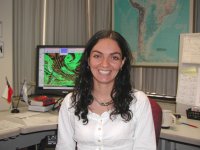
A wintry mix may impact travel across portions of the Ohio Valley, central Appalachians, Mid-Atlantic, and Northeast U.S. today through Tuesday. Gusty winds and low relative humidity will bring elevated to critical fire weather to northeastern New Mexico and southeastern Colorado today and Tuesday. Read More >

 This meteorological, hydrological and climatological fellowship training is funded by the U.S. Government, through a partnership with the World Meteorological Organization (WMO). The purpose of our fellowship training program is to enhance operational meteorology, climatology and hydrology. Attendees will be provided with a stipend for living expenses (housing, meals and transportation) and health insurance.
This meteorological, hydrological and climatological fellowship training is funded by the U.S. Government, through a partnership with the World Meteorological Organization (WMO). The purpose of our fellowship training program is to enhance operational meteorology, climatology and hydrology. Attendees will be provided with a stipend for living expenses (housing, meals and transportation) and health insurance.
SEE MORE PHOTOS
Interested candidates should submit a Voluntary Cooperation Program (VCP) fellowship application to WMO through their Permanent Representative. Below is a list of our fellowship program.
Under VCP procedures, Members are invited to submit official request forms under the VCP. After review of the request in the WMO Secretariat and subsequent consideration by the President of WMO, a consolidated list of project requests under the VCP is circulated among Member countries. Donor Members able and willing to offer support under the VCP, decide what support will be provided and, in most cases, make the arrangements. The WMO Secretariat, upon notification of support, assists as required and also arranges for the agreement between the donor's Government and the recipient's Government.
The South American Desk started in 1988 to train international forecasters from Argentina, Brazil and Uruguay, and was later expanded to include all of South America (Region III). The program is tailored to meet the operational needs of a modern forecast office, and to make the best use of available tools/objective forecasting in applied meteorology, hydrology and climate with training curriculum covering diverse subject such as jet dynamics, streamline analysis, atmosphere stability, boundary detection and identification, analysis of constant pressure charts, numerical weather prediction, and PCGRIDDS.
Location: National Centers of Environmental Prediction, College Park, Maryland.
Duration: four months.
MORE INFORMATION
The Tropical Training Desk started in 1992 to enhance meteorological skills of international forecasters from Mexico, the Bahamas, Panama, Colombia, Barbados, and Trinidad along with other Caribbean Basin countries (Region IV). It has a training curriculum very similar to the South American Desk, as they also train in the dynamics of the atmosphere, operational application of numerical weather prediction, and tropical meteorology.
Location: National Centers of Environmental Prediction, College Park, Maryland.
Duration: four months.
MORE INFORMATION
The Africa Training Desk was started at NCEP circa 1994 to focus on short term climate monitoring and prediction for Africa. This Desk provides training in methods of climate monitoring and prediction with some training in numerical weather prediction, forecasting and hydrology. The objective of the Africa Training Desk is to develop a partnership between NWS and the African Meteorological Services through data and product exchange and to create a cadre of meteorologists who can use and apply NWS products in their local and general area of interest. The Africa Desk conducts three main programs: Training, Operations, and Development. These programs are managed jointly by NWS (NCEP and W/IA) and the WMO. The Africa Desk receives partial funding from the USAID/Famine Early Warning System Project to put together products tailored to assess vulnerability in Africa related to food security and water supplies.
Location: National Centers of Environmental Prediction, College Park, Maryland.
Duration: four months.
MORE INFORMATION
The Pacific Desk started in 2001 to train international forecasters from WMO Region V Southwest-Pacific) that included island nations from the South Pacific and the RA II portion of Southeast Asia. The program is tailored to meet the operational needs of a modern forecast office, and to make the best use of available tools/objective forecasting in applied meteorology, hydrology and climate with the training curriculum covering diverse subject such as jet dynamics, streamline analysis, atmosphere stability, boundary detection and identification, analysis of constant pressure charts, numerical weather prediction, and PCGRIDDS. When the program is fully funded, six or seven forecasters are trained each year in addition up to three countries are visited per year by the Pacific Desk Instructor. During these visitations, the Pacific Desk Instructor will conduct refresher training for previous Pacific Desk interns; verify the correct setup of the appropriate computer and update as necessary; conduct a 2-day general training for the National Meteorological Services (NMS) staff; and make necessary modifications to the present training plan.
Location: Central Pacific Hurricane Center, Honolulu, Hawaii.
Duration: six weeks.